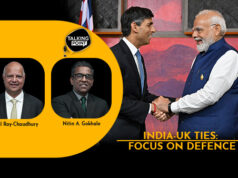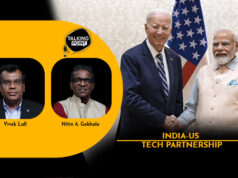NEW DELHI: India’s Defence Minister Rajnath Singh’s 140 minute talks with his Chinese counterpart General Wei Fanghe in Moscow on the sidelines of the Shanghai Cooperation Organisation (SCO) meeting are more important for “what is said in private rather than public,” says Ravi Agrawal, Managing Editor, Foreign Policy. That’s where, he adds “they’ll have honest conversations, be able to make concessions” away from all the “muscular messaging.” Leaders on both sides need to “seize” these kinds of “diplomatic opportunities” rather than having to “carve out such (bilateral)meetings,” Professor M. Taylor Fravel, Director, Massachusetts Institute of Technology(MIT) Security Studies Programme says in agreement. Speaking on Talking Point with StratNews Global Associate Editor Amitabh P. Revi, the Professor says the latest standoff in Ladakh is “India deciding to seize the initiative by taking several peaks in an effort to gain some bargaining advantage in negotiations”. Agrawal concurs, saying, “it was important to be proactive and change the dynamics to trade in talks” after being “behind the eight ball from the start” with “reactive responses so far”.
With rounds of negotiations resulting in little agreement, the Arthur and Ruth Sloan Professor, MIT, points out “talks would ultimately have to occur at a higher level or be at the direction of more senior Chinese leaders. He feels India’s ‘preemptive’ moves on the ground in Ladakh “may be a way to get China’s attention ” and to indicate “India is serious about the demands it has put forward and eager to raise the level of the talks”. China is playing “catch up on this particular incident” and official statements are “reactive” seemingly acknowledging Beijing has been “caught off guard,” Agrawal says, pointing to spokespersons “improvising” in their response to questions.
Professor Fravel, Author of ‘Active Defense: China’s Military Strategy Since 1949’, warns this may just be “the start of a spiral” as China may decide to “escalate and occupy other vacant territory elsewhere in other sectors or make a move against Arunachal Pradesh,” adding, “the music may not have stopped”. Agrawal, the author of ‘India Connected’, also cautions the media and those telling the story against “a rise in jingoistic sentiments”, saying both sides must have “off-ramps” to allow a disengagement and de-escalation.




